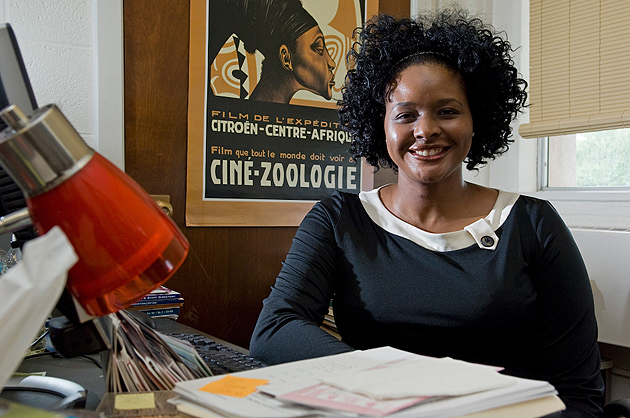
When Shayla Nunnally was a little girl, she loved the theater. After her mother took her to see the musical Annie, Nunnally wanted nothing more than to play the character of the little orphan.
But when she told her parents about her aspiration, her mother looked at her and said poignantly, “That’s not going to happen, baby.”
“I didn’t understand why,” says Nunnally, associate professor of political science and African-American studies, and a black woman. “My parents had always been encouraging and told me that I could be whatever I wanted to be, but this time, it was different.”
The exchange was a telling example of many of the cultural experiences black Americans have gone through in recent decades. Nunnally’s new book, titled Trust in Black America: Race, Discrimination, and Politics (NYU Press, 2012), analyzes the limits, many stemming from overt or covert racism, placed on the black community – and the subsequent distrust that it fosters for them.
Because blacks were traditionally limited in the roles they could play in society, Nunnally explains, black children often experienced racial socialization, or the realization of social norms about race instilled in them by their parents.
“Black parents had to maintain a delicate balance between instilling in their children that anything is possible, while understanding the harsh realities of the barriers that their and their children’s race might present in some of their everyday aspirations and accomplishments, due to the possibility of racism, says Nunnally.
So, for black children with lofty aspirations – such as to become President, for example – many black parents may have accepted their children’s aspirations with a deep-down, hidden recognition that this would likely never happen in their lifetimes.
“But,” says Nunnally with a smile, “now we have a black president.”
Nunnally’s book shows that both socially and politically, blacks are the least trusting racial group in the U.S. It shows that their legacy of experiencing racial discrimination makes them distant from and distrustful of the American political system, its institutions, and its politicians.
Although racial discrimination and political marginalization have often been cited as reasons blacks are distrustful of the government, Nunnally says that until now, this claim has largely gone untested.
“I wanted to know how people are taught and learn about race across different racial groups, and the extent to which their race has affected them systematically,” says Nunnally.

In her book, Nunnally presents an analysis of her national survey of blacks, whites, and Latinos about their racial attitudes. For blacks, she also asked about their racial socialization and the influence of race on their relationships to society. She finds that many blacks’ opinions depend on whether they’ve been taught by their parents to be cautious of other races.
But rather than just the result of an individual’s experiences, race is a legacy experience, explains Nunnally. Historically, blacks as a group have seen themselves as excluded from politics, and that frames their democratic experience, regardless of the current political climate.
“Due to blacks being forced into a parallel society, they developed their own institutions, churches, colleges, and newspapers,” says Nunnally. “That was their social capital, the context of how they related to one another and provided resources for their communities, when government and the larger society would not.”
Nunnally’s data show that among political candidates, blacks have the most trust in black Democrats and the least trust in white Republicans. Political trust thus forms around race and partisanship, she says.
Other results suggest that blacks are more distrusting of whites than they are of Asian Americans and Latinos in some circumstances. But, says Nunnally, the extent of racial distrust can be complicated. For example, there is the possibility that blacks may still distrust or be skeptical about a white candidate who may effectively fight for black group interests.
In the case of the country’s most prominent black politician, President Barack Obama, these race lines still hold true. Blacks may perceive that others are biased against him because of his race, says Nunnally. Or they may think that because he has to appeal to the masses, he hasn’t put the needs of blacks high enough on his agenda.
“Race continues to play a role in American politics,” she says. “Since the election of President Obama, there have been conversations about being in a post-racial America – but we’re not.”
Nunnally’s next project will focus on intergenerational race politics. Her work will compare blacks’ political attitudes and experiences from the pre- and post-civil-rights generations.
As for Nunnally’s childhood ambition, she’s very excited that Willow Smith, daughter of actor Will Smith, is said to be starring in a film remake of Annie.
“That’s my dream come true,” she says. “I have to get my tickets to see that!”



